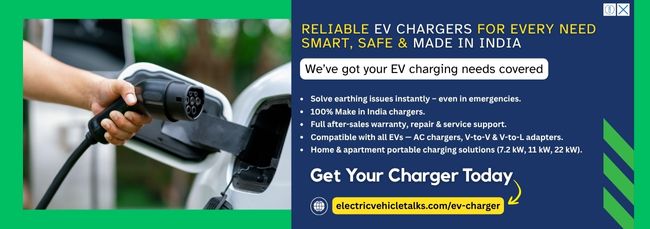Electric vehicles are reshaping the future of mobility, but the real question every EV owner faces is – what’s the smartest way to charge your car? The answer lies in understanding the difference between Portable and Wall-Mount EV chargers. One offers freedom and flexibility wherever you go, while the other delivers speed, safety, and smart home convenience. But which option truly suits your lifestyle and budget? In this blog, we’ll unravel the features, advantages, and drawbacks of both chargers to help you make the perfect charging choice for your electric journey.
Understanding EV Charging and Battery Care
Before diving into the charger types, it’s important to understand why proper charging matters.
Your electric vehicle runs on a large, rechargeable battery, similar to the one in your phone or laptop, but much more powerful and expensive. Just like how improper charging can shorten the life of a phone battery, the same applies to EV batteries. Caring for your EV battery is crucial because it’s one of the most expensive components of your vehicle and determines how long your car will stay in top shape.
Using AC chargers (Alternating Current), whether portable or wall-mounted, can actually help extend your battery’s lifespan compared to DC fast chargers. This is because AC charging is gentler and charges the battery at a slower, more controlled rate, reducing heat and wear on the battery cells.
Now, let’s look at the two most common types of AC chargers: portable and wall-mounted, and what makes each unique.
What Is a Portable EV Charger?
A portable AC EV charger is a small, lightweight device that allows you to charge your electric car anywhere you have access to a compatible power outlet. Think of it as a travel-friendly power bank for your car.
These chargers are designed to plug into standard electrical sockets, similar to how you would charge your phone or laptop. Most portable chargers weigh between 5 and 20 pounds and often come with a carry bag or case for easy transport.
How Does It Work?
Portable AC chargers draw electricity from an existing wall socket and deliver it to your car’s charging port. Depending on your country or vehicle, these chargers typically use common connectors, like J1772 in North America or Type 2 in Europe. Tesla vehicles might need a simple adapter to connect.
There are two main charging levels for portable AC chargers:
- Level 1 Charging (120V): Uses a standard household outlet and provides 1.4–2.4 kW of power. It adds around 4–5 miles of range per hour, slow but ideal for overnight charging or emergencies.
- Level 2 Charging (240V): Uses a higher voltage outlet (like those for dryers or ovens) and delivers between 3.7 and 11.5 kW of power. This can add 15–45 miles of range per hour, making it much faster and more practical for regular charging.
Most portable chargers also include safety features such as temperature sensors, overcurrent protection, and automatic shut-off to prevent overheating or electrical faults.
Pros and Cons of Portable EV Chargers
| Pros | Cons |
|---|---|
| Flexibility / Mobility: Can be carried in your vehicle and used anywhere there is a compatible outlet (standard 120V or 240V). | Slower Charging Speeds: Typically have a lower power output (e.g., a 3.5 kW charger can take ~17 hours to fully charge a 60 kWh battery). |
| No Installation Required: Plug-and-play functionality saves time and money on professional installation. | Limited Power Output: May not meet the daily demands of high-mileage drivers or larger EV batteries. |
| Lower Upfront Cost: Generally more affordable to purchase than a wall-mounted charger and its installation. | Less Durable: More prone to wear and tear from frequent handling, transportation, and exposure to different environments. |
| Ideal for Renters / Travelers: Excellent for temporary living situations or as a backup for emergencies on the road. | Potential Safety Concerns: Safety relies heavily on the quality and condition of the existing outlet and wiring, which can pose a fire hazard if not up to standard. |
| Portable & Convenient: Lightweight and compact, easy to carry and store in your car trunk. | Dependent on Power Source: Charging performance may vary depending on the availability and stability of the power supply. |
What Is a Wall-Mounted AC EV Charger?
A wall-mounted EV charger, often called a home charging station, is a more permanent solution installed on a wall or pedestal, typically in your garage or driveway.
Unlike portable chargers, wall-mounted chargers are fixed installations that require professional setup. They are directly connected to your home’s electrical system, usually a dedicated 240V circuit, which allows them to deliver more power and charge your EV much faster.
How Does It Work?
Once installed, you simply plug your car into the charger whenever you park at home. These chargers are designed for everyday use and can safely handle continuous high-power charging.
Many modern wall-mounted chargers also come with smart features, such as:
- Scheduling charge times (to take advantage of cheaper electricity rates at night)
- Monitoring energy usage via a smartphone app
- Integration with home solar systems to charge using renewable energy
- Remote control and notifications about charging progress
Pros and Cons of Wall-Mounted AC EV Chargers
| Pros | Cons |
|---|---|
| Faster Charging Speeds: Wall-mounted chargers deliver higher power output (e.g., a 7 kW charger can fully charge a 60 kWh battery in about 8 hours), making them ideal for overnight or daily use. | Higher Initial Cost: The combined cost of the unit and professional installation is significantly higher than portable chargers. |
| Convenience & Comfort: Transforms your garage or parking space into a personal charging station—simply park, plug in, and your EV is ready by morning. | Requires Professional Installation: Needs a licensed electrician and possibly an electrical panel upgrade for safe, high-capacity operation. |
| Enhanced Safety & Reliability: Built for continuous, high-current charging with features like surge protection, ground fault detection, and automatic shut-off; weather-resistant for outdoor use. | Lack of Portability: Once installed, it’s fixed in place and cannot be easily moved or taken on trips. |
| Smart Features: Many models offer Wi-Fi or Bluetooth connectivity, app control, charge scheduling to use off-peak electricity rates, and integration with solar or smart home systems. | Requires Dedicated Parking Space: Best suited for users with a permanent garage or private parking spot. |
| Durability: Designed for long-term, stationary use with robust materials and weatherproof construction, ensuring low maintenance and longevity. | Outdoor Vulnerability: When installed outdoors, units may still face risks from weather, vandalism, or accidental damage despite being weather-resistant. |
Portable vs. Wall-Mount: Which One Should You Choose?
The choice between a portable and wall-mounted AC EV charger depends largely on your lifestyle, driving habits, and budget.
| Feature | Portable AC Charger | Wall-Mounted AC Charger |
|---|---|---|
| Charging Speed | Slower (Level 1 or 2) | Much faster (Level 2) |
| Installation | Plug-and-play | Requires professional setup |
| Portability | Highly portable | Fixed in one location |
| Cost | Lower | Higher |
| Safety | Depends on outlet quality | Built-in safety systems |
| Best For | Occasional users, travelers | Daily EV users, home charging |
Conclusion
Both portable and wall-mounted AC EV chargers play important roles in the electric vehicle ecosystem. Portable chargers give you freedom and flexibility, ensuring you can charge anywhere, while wall-mounted chargers offer speed, safety, and convenience for daily home use.
Choosing between the two isn’t about which one is better overall – it’s about what fits your lifestyle best. For those who value mobility and affordability, portable chargers are ideal. But for those who prefer efficiency and reliability, wall-mounted chargers are the smarter, long-term choice.
A wide range of EV chargers and adapters are available in today’s market. If you’re looking for reliable options for your electric vehicle, click the image below to explore the best choices!

Related Articles:-





